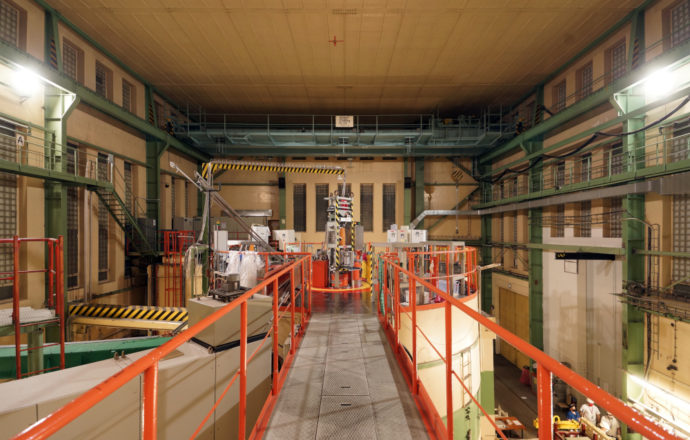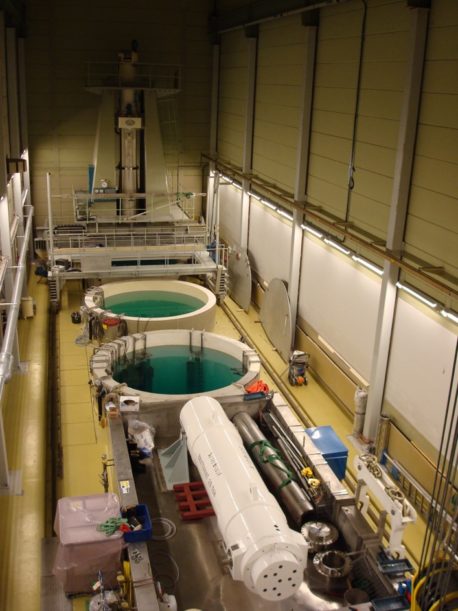New international research projects
ENSI is participating in two large-scale international research projects providing data on the ageing phenomena of reactors and on the operating and accident behaviour of fuel rods. The findings are being incorporated into ENSI’s safety assessments.
As part of its regulatory safety research, ENSI has joined two new international research projects that are taking place under the patronage of the Nuclear Energy Agency (NEA).
As part of the Organisation for Economic Cooperation and Development (OECD), the NEA promotes the safe and peaceful use of nuclear energy and in this context supports a large number of research projects. Switzerland is one of the agency’s 33 member countries.
What is the role of the NEA?
With its head office in Paris, the NEA supports its member countries in the continuing development of technical, scientific and legal aspects of nuclear energy. It promotes a common understanding of key nuclear safety questions and develops opinions that can serve as a basis for decision-making in member states.
Its core competencies are wide and varied: reactor safety, oversight of nuclear installations, radioactive waste disposal, radiation protection, economic and technical analyses of the fuel cycle, nuclear power legislation and liability, economic and social issues and public information. The NEA supports a large number of research projects in these technical areas.
ENSI has incorporated two new NEA research projects into its programme. These are NEA FIDES (Framework for Irradiation Experiments) concerning irradiation experiments in research reactors and NEA SMILE (Studsvik Material Integrity Life Extension) on ageing phenomena.
NEA FIDES: Irradiation experiments under reactor conditions
The FIDES programme is designed to succeed the Halden Reactor Project: various research institutes are conducting radiation experiments in research reactors in which small samples are subjected locally to conditions found in power reactors. The purpose of these experiments is firstly to study fuels and secondly to study structural materials.

Figure: Centrum výzkumu Řež
Within the experiments, fuels are tested for their safety margins, especially in respect of their behaviour during accidents. In France and Belgium, for example, fuel rods are being tested to determine how wide the fuel rod integrity safety margins are when operating at high performance for fuel rods. This means that the test allows conclusions to be drawn concerning the performance levels up to which cladding tubes remain intact, even if the fuel inside the cladding has already started to melt.
These results are particularly relevant for ENSI as the experiments are being carried out on fuel with a high burnup level and relatively high fuel burnup levels are achieved in Switzerland compared to the rest of the world. In addition to standard commercial fuel, new fuels with increased accident tolerances are also to be investigated. Such experiments are key to the comprehensive assessment of these new developments.
Investigations into structural materials are primarily concerned with their embrittlement and susceptibility to cracking as a result of neutron radiation. No experiments are currently being conducted in this respect. Nevertheless, corresponding experiments are already being planned.
The first phase of the project will last until 2023 with institutions from 13 countries currently participating in the project. ENSI is interested in the results of the experiments because – for cost reasons and given the lack of a suitable reactor – it would not be possible to perform comparable tests under reactor conditions in Switzerland. Through its participation in the technical committees, ENSI has an opportunity to submit its own ideas for the design of the experiments.
NEA SMILE: Research into the safety of long-term operation

In the SMILE project, running until 2025, samples of material will be obtained from three decommissioned Swedish reactors including from the reactor pressure vessels, core internals, pressurisers and components of the cooling circuit. Sixteen organisations from eight countries are participating in this project. The research is investigating material samples in respect of different ageing processes, such as embrittlement caused by neutron radiation, thermal ageing or cracking, and fatigue behaviour.
The examination of materials that have been exposed to real reactor conditions for decades is valuable for Switzerland because of its interest in the long-term operation of nuclear power plants. The SMILE project will make it possible to consolidate and improve the level of knowledge of ageing phenomena and extend the ageing phenomena database. This is also one of the priorities of the ENSI research strategy.
Amongst other things, this large-scale project is providing ENSI with information on the development of the ageing management programmes used in the Swiss nuclear power plants. The ageing management programmes are based on models of the various ageing events. The new findings can be used to check the models currently being used. Moreover, ENSI can also use the results to assess the concepts that have been planned for long-term operation.
Why ENSI participates in research projects
Regulatory safety research provides the basis for ENSI’s regulatory activities and strengthens its independent expertise. Therefore, ENSI is participating in a multitude of research projects, extending from projects on fuels and materials through to system behaviour and accident processes as well as disposal.
Especially in the case of international projects, ENSI stands to benefit not only from experimental results, but also from the professional exchange with experts from the other participating institutions. The current research programme is presented in detail in the Research and Experience Report.

